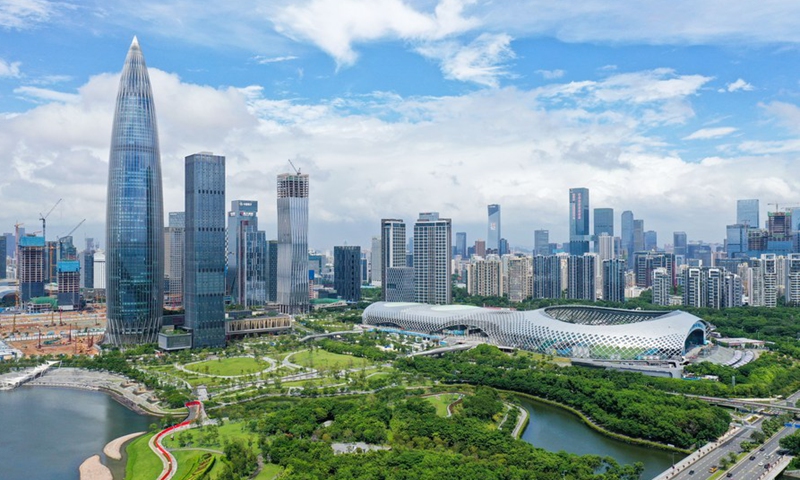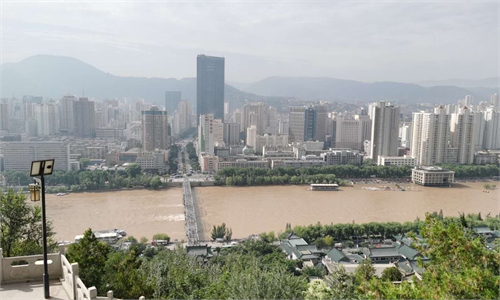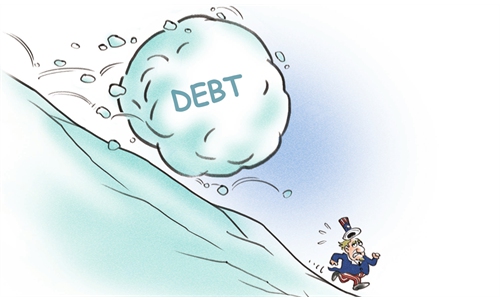Why China takes humble rejuvenation road

Aerial photo taken on Sept. 17, 2020 shows the Houhai area in Nanshan District of Shenzhen, south China's Guangdong Province. Photo:Xinhua
I was one of the keynote speakers of the 2020 Annual Meeting of the Valdai Discussion Club in Russia. Russian President Vladimir Putin took questions from participants on the last day of the meeting. .
Putin said that China is now heading for superpower status. US billionaire hedge fund manager Ray Dalio, who spoke on the same panel with me, also talked about the future of China replacing the US. In a recent article for the Financial Times, he stated, "every day we see China succeeding in exceptional ways."
Influenced by US President Donald Trump's administration, international public opinion toward China has been biased. Against such a background, it's happy to hear that global political and commercial leaders such as Putin and Dalio are hailing China. As a Chinese scholar, I appreciate their support.
But on the other hand, I don't think China will become a new superpower like the US. The US has established more than 600 military bases around the world. US social values are popular among international society, and many US universities are the most preferred destinations by young people across the world. Besides, the US dollar accounts for about 60 percent of global foreign exchange reserves. In the foreseeable future, it will be difficult for China to become as strong as the US in these areas.
However, if we compare the US to a dilapidated skyscraper, it must be admitted that the building is really quite old. It could even collapse. But it's still the highest in the world. While US hegemony is declining, no other country can currently replace it.
You may not believe, but it's a fact that every year I was invited to the Chinese government's consultation meetings, but at none of them have I ever heard of any Chinese official talking about China's replacing the US. Nor have I encountered any government official who is making plans for China to become a global superpower.
President Xi Jinping spoke highly of the achievements of both reform and opening-up, praising the 40-year development of Shenzhen Special Economic Zone. Yet he has never mentioned that China has succeeded. Even though China basically curbed the spread of the deadly novel coronavirus as early as the middle of March, the Chinese government does not portray it as a "success." It merely said this was a "phased victory."
President Xi often reminds the Chinese people that they should avoid arrogance and rash behavior. His narrative deeply impressed me, especially this line: "We are now in a state very much like sailing to the midstream of a river or climbing halfway up a mountain, as the goings get tough, we must press ahead and there's no turning back."
China has gone a long way over the past four decades. However, we should overcome more difficulties and challenges in the future. Chinese people will not easily label them as successes per se, nor consider replacing any country.
It is true that some public opinion express some conceited sentiments, claiming that China is becoming superior to other countries. But this is merely part of the oceans of opinions out there. In recent years, one of the most significant aspects of China's social evolution involves a diverse awareness of the country's national power.
I have always advocated evaluating China's strength by sectors and industries. As for China's overall national power, I hope that China will be humbler and more low-key. I hope that foreign friends will not see China with exaggerated interpretations at this critical time when the COVID-19 pandemic is still raging across the world.
The pandemic has so far killed more than 1.1 million people and bankrupted tens of millions of families. This is tragic. Quite a few people have been tricked by the US into believing that the virus is the result of Chinese labs or early cover-ups and hatred toward China is spewed all over Twitter and Facebook.
But those who hate China need not vent their anger on us. China has not had it easy as well. Even though China led itself into a recovery and achieved some positive economic growth, the reality is that the pandemic has put China into one of its worst periods in modern history. The last time domestic growth fell below 4 percent was in 1990 (3.91 percent), when the West imposed collective sanctions on China.
Global development is entering a downturn. Right now, huddling together is probably the best option for the world. As I wrote in my book Great Power's Long March Road, the Chinese are on a long march now.
We need to look at the current challenges and opportunities with a mentality of battling in a protracted war. We must be more mature, not pleased by gains. Meanwhile, Chinese people ought not to be saddened by personal losses. This is a time to be down-to-earth, modest and prudent, in order to finally achieve the dream of national rejuvenation.
The author is professor and executive dean of Chongyang Institute for Financial Studies at Renmin University of China. wangwen2013@ruc.edu.cn



